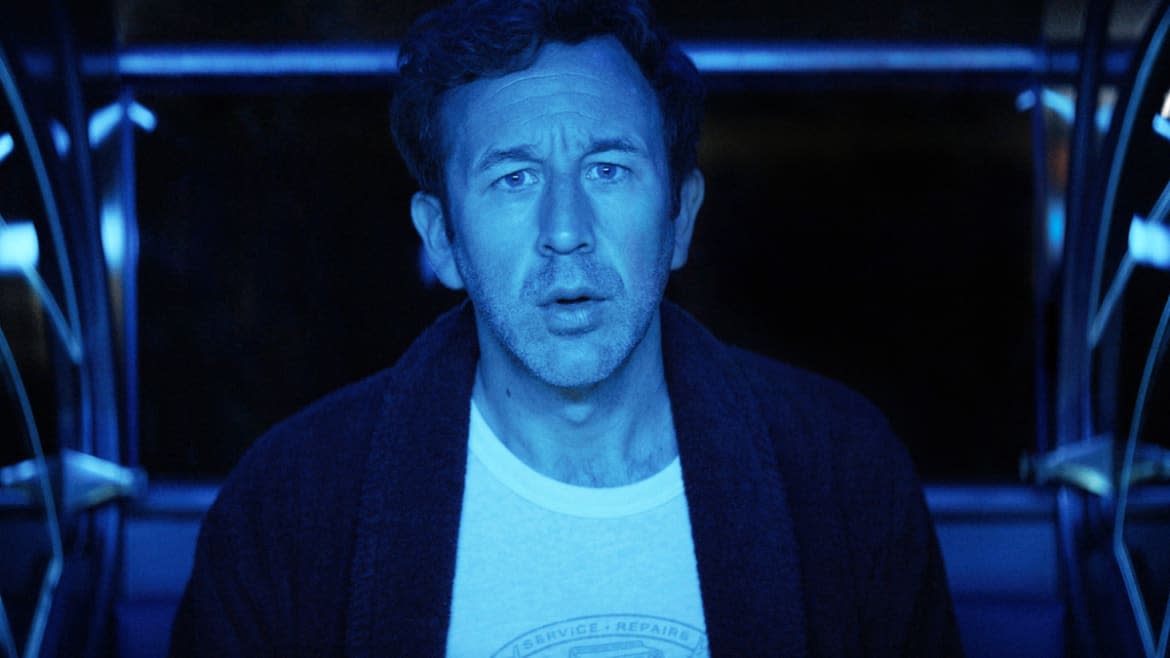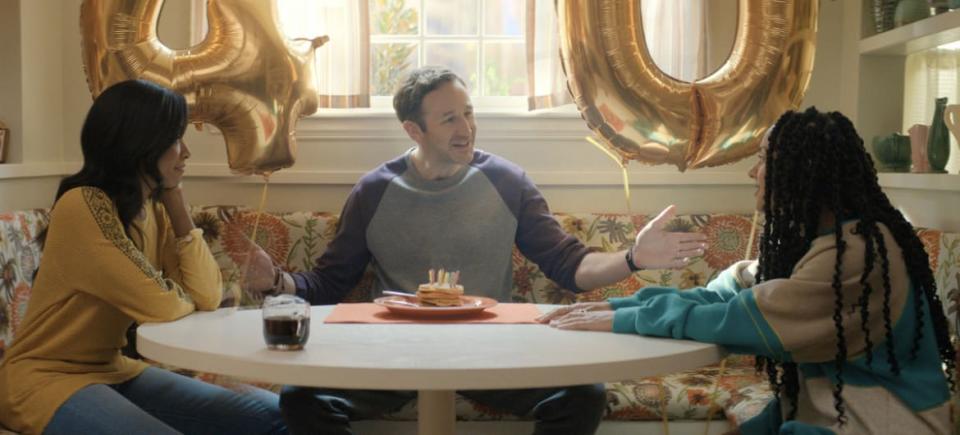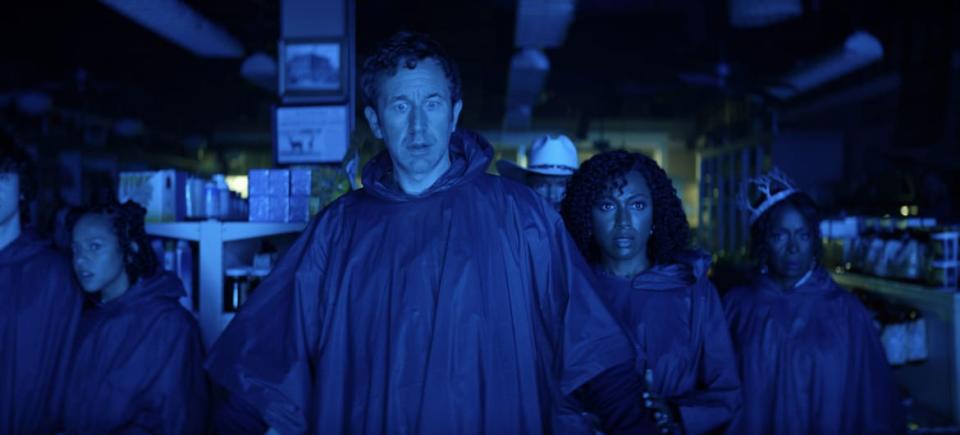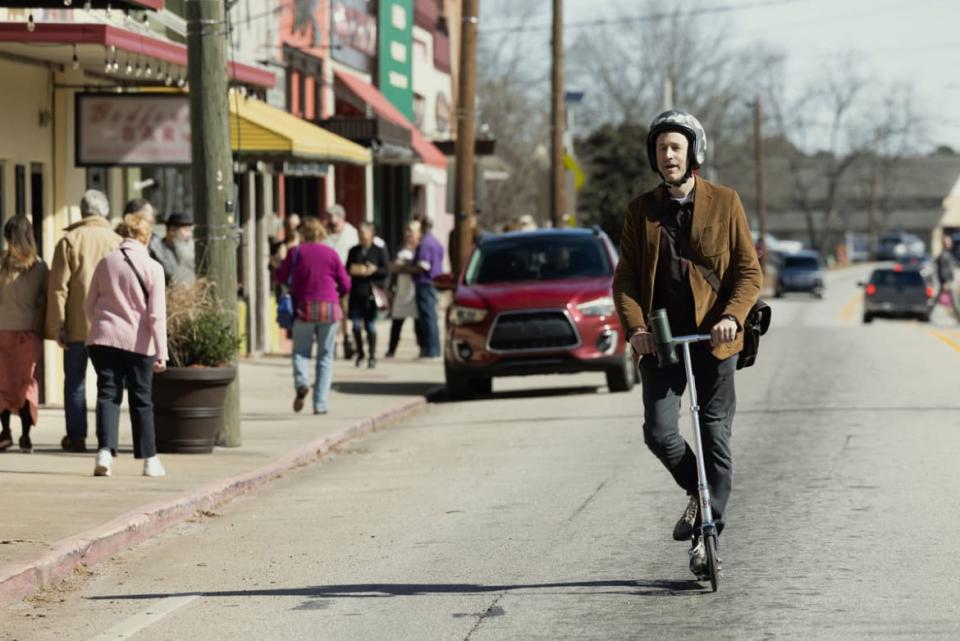‘The Big Door Prize’ Is the ‘Ted Lasso’ Antidote We Need

- Oops!Something went wrong.Please try again later.
For the last 11 years, there has been a line of cinematic dialogue bouncing about my head, ricocheting between the cortexes of my brain like a ball someone shot out of a canon. In the often-forgotten Pixar movie Brave (I have never been—nor ever will be—a Disney adult, but bear with me), the lead character, Merida, ponders: “If you had the chance to change your fate, would you?” The reason this line has taken up residence in my silly little brain is not so much because it’s profound, but because Merida says this in a thick Scottish accent. “Would you,” sounds more like, “Whoo’jer?”
Still, every time I get suckered into toting this line reading along with me for hours, I begin to wonder. Would I? Sorry, Whoo’ji?
The Big Door Prize, which airs its first three episodes Wednesday on Apple TV+, asks a similarly existential question. The series, adapted from M.O. Walsh’s 2020 novel of the same name, unfolds in the small, idyllic town of Deerfield, where a mysterious machine has just appeared in the local general store.
The contraption, called the “MORPHO,” promises users that it will reveal their life’s potential for the price of only eight quarters (and maybe a couple of pieces of personal data). Faced with the assurance that they’ll have their true selves revealed, Deerfield’s zany residents line up to fork over their two dollars. It turns out, one little word on a card of paper stock is enough to turn this town upside down.

But things don’t go awry in the ways that one would think they might if an entire town was suddenly thrust into interpersonal crises. Despite its heady premise, The Big Door Prize balances the weight of philosophical reflection with keen, intelligently crafted humor surprisingly well. What could easily be an obnoxiously high-concept study of humanity flies by with winsome joy, refusing to waste its time on overcomplicated storytelling that never gets to the point. Propelled by a fabulous ensemble cast, The Big Door Prize is a compassionate examination of life’s cosmic comedy.
Faced with turning 40, Deerfield’s beloved history teacher, Dusty (Chris O’Dowd), is already in the throes of a midlife retrospective. Sure, by anyone’s standards, Dusty has a great life. He adores his job; he’s got a loving, supportive wife in Cass (Gabrielle Dennis); and their daughter, Trina (Djouliet Amara), is the spitfire combination of both of her parents. But a recent, tragic accident that has shaken Deerfield has left him more on edge, a place he’s not used to teetering.
When the MORPHO machine appears, Dusty thinks nothing of it, writing it off as some silly digital fortune cookie. That is, until everyone—Cass and Trina included—has pulled a card from the machine, and begins to alter their lives accordingly. Some, like Deerfield’s High’s eccentric principal, take their cards literally. “Biker” can only mean so many things, why not pull up to her designated parking spot on a hog? Others use their cards as an encouragement to infer meaning, letting the MORPHO’s winking words be a nudge toward major life changes. Divorce! Sexual bucket lists! Moving out of town! It’s all on the table.
This Biting, Brilliant Show Will Be HBO’s Next Sleeper Hit
At first, no one’s behavior is necessarily erratic. But it is noticeable, and Dusty can spot the small changes with the naked eye. It’s never specifically stated, but it seems that this is The Big Door Prize’s modern take on the Butterfly Effect. After all, a morpho is a genus of tropical butterflies, and the alterations being made by the closely-knit citizens of Deerfield are starting to have a ripple of consequences on the entire town.
These tiny developments present themselves in genuinely hilarious ways, as everyone tries to fit themselves into what they think their life’s potential is telling them. The show’s writers have a great knack for situating themselves into the peculiarity of small-town life. The humor is so consistent, and crafted with so much heart and mindfulness, that when big-swing gags happen—like Cass’ mother Izzy (the great Crystal Fox) doing an erotic dance to woo her ex-girlfriend at a wedding—they’re all the more surprising.

Each episode of The Big Door Prize focuses on a different Deerfield resident. Character-centered, episodic stories can be hit or miss, but the series stitches together such a remarkably woven tapestry of personalities that the show’s narrative arc never dips—even when viewers think they’re about to fire up an episode titled after a character they don’t particularly have much interest in. All that speaks to the strength of Dusty and Cass. As the show leads, the couple is written with such a dextrous combination of affection and wit that they keep things perfectly paced. O’Dowd and Dennis’ perfect chemistry, and the godsend of half-hour episodes, don’t hurt on that front, either.
The Big Door Prize taps everything out of its clever double-entendre title. Yes, these characters are all getting a big door prize, so to speak. But they’re also being gifted with a big door prize. For this little town, the MORPHO machine isn’t simply supplying them with suggestions, but rather a gateway to something else. With the help of a little piece of construction paper in a blue envelope, Deerfield is stepping over the threshold, and into a universe full of possibilities beyond what the town had ever imagined. Though the mysteries behind the machine’s origin stay cooking on the backburner through the first half of the season, viewers will remain hooked by their own constant pondering of their own potential.
‘The Night Agent’ Forgets That Political Thrillers Should Be…Thrilling
There lies one of The Big Door Prize’s most ingenious tricks. Here is a show that asks its viewers to examine their own realities while they’re lying on their couches. And not by force, either. It would be easy for the series to lean on false existentialism and pose empty questions to its audience, serving them crumbs and hoping that they make a meal out of nothing. But it doesn’t! Instead, The Big Door Prize prods us to examine life’s little signs, and try to use our time wisely—suggesting that impact can’t be measured by recognition, but by self-love.
Though the show may feel occasionally obvious in its messaging, it sneaks in kernels of truth that are far more effective than anything on its surface. The Big Door Prize is, no doubt, a comical examination of how we let technology, and other people’s carefully crafted social media accounts, dictate how we feel about our own lives. But it doesn’t chide viewers for falling prey to algorithmic hell. Rather, it asserts that there is always more to be discovered, learned, and felt.

In a way, this might be Apple TV+’s realist antidote to the saccharine odiousness of Ted Lasso, which has been examining life from an entirely uncritical lens for far too long. The Big Door Prize sees all of the good and bad in life, and keeps them on a constantly shifting scale. It acknowledges the difficulty of constant upward mobility, and assuages our intrinsic human guilt for not doing all we can, all the time. Small steps forward into the unknown can be even more meaningful than moving leaps and bounds without looking. All it takes is one MORPHO card—or one streaming television show—to remind us of that.
The Big Door Prize premieres March 29 on Apple TV+.
Liked this review? Sign up to get our weekly See Skip newsletter every Tuesday and find out what new shows and movies are worth watching, and which aren’t.
Get the Daily Beast's biggest scoops and scandals delivered right to your inbox. Sign up now.
Stay informed and gain unlimited access to the Daily Beast's unmatched reporting. Subscribe now.

